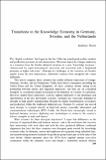Transitions to the Knowledge Economy in Germany, Sweden and the Netherlands
Author(s)
Thelen, Kathleen
DownloadWe have permission from the publisher to use this Comparative Politics version of the article (397.3Kb)
PUBLISHER_POLICY
Publisher Policy
Article is made available in accordance with the publisher's policy and may be subject to US copyright law. Please refer to the publisher's site for terms of use.
Terms of use
Metadata
Show full item recordAbstract
The “digital revolution” that began in the late 1960s has transformed product markets and production processes in rich democracies. Observers depict the changes underway as a transition from the Fordist industrial economy to a new “knowledge economy,” characterized by rapid technological innovation and associated with a heightened premium on higher education.1 Although the challenges of this transition are broadly similar across the rich democracies, individual countries have navigated the course differently.
Date issued
2019-01Department
Massachusetts Institute of Technology. Department of Political ScienceJournal
Comparative Politics
Citation
Thelen, Kathleen. "Transitions to the Knowledge Economy in Germany, Sweden, and the Netherlands". Comparative Politics 51, 2 (January 2019) © The Graduate Center, CUNY
Version: Final published version